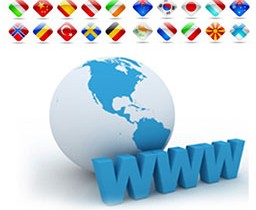Greater than 5 minutes, my friend!
Building A Website For Your Translation Business – Part 2 Choosing a domain name for your translation business
This blog post was originally published on my blog: Best Russian Translator.
Hey guys! Welcome back! For those of you who missed my first part, you can find it right here. To be honest, I was completely blown away by the incredible amount of feedback and support I got here and in various social networks. I’m super glad that I can inspire you guys and really happy that you find it useful. That means I’m on the right track! I want to give a big shout-out to all my new subscribers: Jared, Gabriel, Viktoria, Susanne, Jennica, Aude, Idan, Alexia, Matouš, Jasmine, Claire, Natalia, Frederik and Federica. You guys rock!
But back to business! If you followed my instructions carefully you now have your very own unique brand identity. That’s awesome and congrats on starting this amazing journey. But before we jump into technicalities let’s talk about one very important thing:
Why do you even need a website for your translation business?
Even though the idea of having your own website seems pretty exciting, some people find it unnecessary. To some extent, maintaining a website seems like a burden to them, a burden that takes a lot of your precious time. The good news is, it’s not 1995 anymore, and with all the modern technologies a single click of the button is all it takes to keep your website up to date. Or in some cases, your hosting company can do that for you.
I’ve pinned down 5 main reasons why I think every single translator should have a website:
1) It increases your visibility. It may not seem like it at first, but over time your website will definitely bring your some exciting clients. And if you make an effort and apply your marketing knowledge, the payoff will be tremendous.
2) It improves your image and credibility. You could be a super professional translator with a gazillion years of experience, but when you use free email services like Gmail or Yahoo, it kind of brings all your marketing efforts to naught.
3) Your professional website can actually save you a lot of money. In our global world where everything is intertwined in all sorts of social networks, having a platform that can showcase your work and ability is probably the best form of advertisement. You can reach wider markets or you can focus on a specific niche (it’s up to you, really). When compared to other forms of advertisement, your professional website is a pretty good investment.
4) It saves you a tremendous amount of time. How often do you send the same information to your prospective clients over and over again? What’s your expertise, experience, education? What services do you offer? What are your prices? Do you have any references? With a website, you can answer all those questions once and for all.
5) It brings you clients. After all, isn’t that what this is all about? Ask any translator with a website and they’ll confirm that.
Choosing a domain name for your translation business
So now you have your brand identity, you know your key values, your strengths, and weaknesses, what you can offer to your potential customers. What’s next? Well, the very first step is choosing a domain name for your translation business. In simple words: a domain name is basically the address you type into the address bar of your browser. For example, my domain name is: bestrussiantranslator.com. Your domain name is important. This is where all your clients would go, this is what you’ll be printing on your business card. It’s an important part of your translation business. Good domain name alone can bring you a lot of traffic and potential clients, so think carefully.
7 rules for choosing a kick-ass domain name for your translation business
1) Consider using keywords. I can safely assume that you’re in the translation business, right? That’s why it has to be reflected in your domain name. Make up a list of 5 terms or phrases that can be used to describe what you do. Think how often do people actually use those words when they go on Google. Try thinking of something unique, yet powerful. A good combination of keywords can seriously improve you ranking on Google.
2) Make it as short as possible. Yes, maybe EnglishIntoItalianTranslatorFromMilan.com describes what you do perfectly it is hardly short. In fact, it’s the opposite of short. You’ll have a really hard time fitting this monstrosity into your business card. And when people see it, they wouldn’t even bother to check it out.
3) Make it easy to remember and type. People love simple domain names or domain names that are easy to remember. There are millions of websites out there so having a catchy domain name is essential.
4) Do a proper research. Makes sure you’re not violating any trademark or copyright with your domain name. Do not try to copy or mimic someone else’s domain name. Be creative and create something of your own.
5) Get the right domain extension. There are hundreds of various domain extensions to choose from: .com, .net, .info, .biz, .org, etc. A .com is a top-level domain extension and seems like a popular option while .org is mainly used for non-profit organizations. Many good .com’s are already taken by the way. Some of them are being sold for ridiculous money (thousands of dollars). That’s why some people prefer using a country-specific extensions. For example, .ca for Canada or .ru for Russia. You can use those extensions only if you want traffic from those countries but in order to attract a broader audience, .com should be your weapon of choice.
6) Use your own brand. Google, Netflix, Uber – we all now what those guys do even though it is not reflected in their domain name. Of course, they’ve spent tons of money and it took them many years to establish those brands, but nobody said it was easy. If you’re creative and have enough time for marketing then go ahead – create the Google of the translation industry. It’s actually a great idea because the majority of consumers have no idea what to do or where to go when they need translation. That’s why creating a “go-to brand” for translation industry have a really good potential. Will you be that brand? It’s up to you.
7) Don’t use slang or misspelled words. Please don’t. I know it looks cool, and the younger audience will be “digging you” but imagine if someone asks you the name of your website. What would you rather do: explain the spelling peculiarities of your domain name to every new prospect you meet or have a domain name that is easy to spell and impossible to screw up when typing into the address bar?
Checking the domain name availability
When you’re trying to figure out what domain name you’re going to choose it’s always a good idea to have a tool that’ll tell you whether this or that domain name has been taken. Because, like I said, all the good domain names have already been registered. That means that you’ll probably have to do a lot of brainstorming.
Those tools are free and you can always check domain name availability by simply googling “domain name availability” and selecting any service you like. I could also recommend the tool of my hosting company. It’s right on their home page and it’s pretty easy to use. You can find it here.
Your Homework
You homework for the weekend is going to be pretty easy, yet important. Come up with a few domain names for your translation business and see if they’re available. Don’t register it just yet, though. In my next blog post, we’ll talk about hosting providers, how to choose them, what to look for, what prices are reasonable, etc. The reason we’re not registering your domain name just yet is simple: you’ll be getting your domain name as a package with your hosting plan. I’ll talk about it in detail in my next blog post.
Home Reading
1) How to Pick a Good Domain Name for Your Website
2) 5 Rules For Choosing A Memorable Domain Name
3) 18 Tools for Picking the Perfect Domain Name
4) How to Choose the Right Domain Name
Photo Credit:




